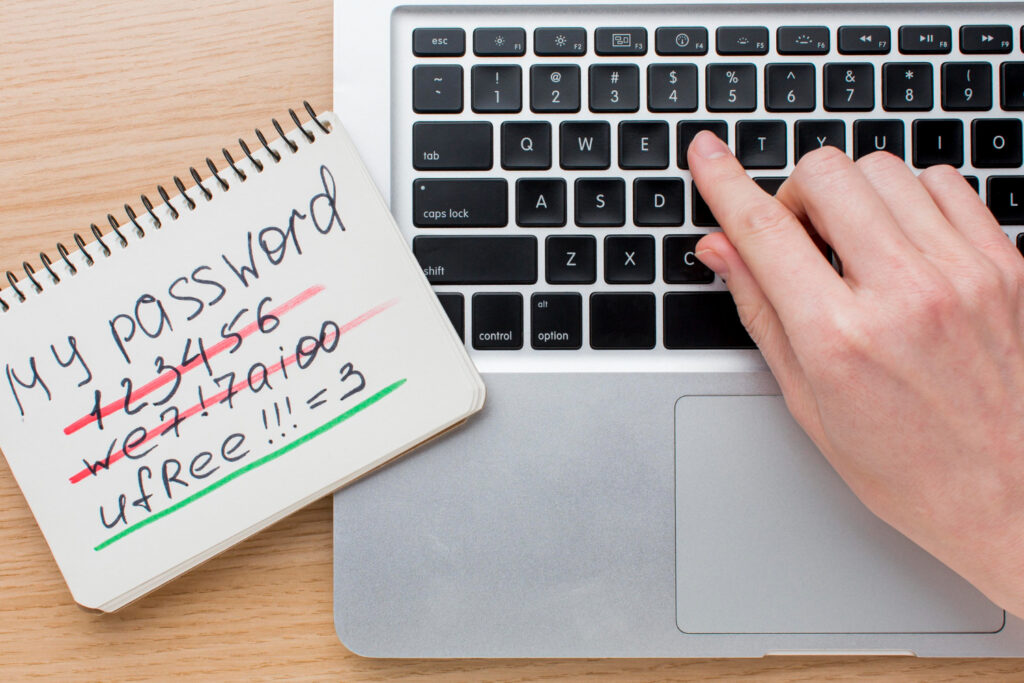
Now-a-days, in the digital age, password security is of greater importance than before. In an era of rising cyber threats, we all must ensure that our passwords are strong enough to protect our online accounts from hackers and unauthorized access. Yet, what makes a password powerful, and how do you construct one that is both secure and easy to remember for you? This thorough guide will take you through the process of making strong passwords offering multiple categories and methods of choice.
Let us now move on to “how to create a strong password and understand why we need strong passwords” first. Hackers can use simple passwords to gain access to your personal details, bank accounts, and confidential information since they can guess or crack them by using automated tools. An effective password should, however, be more complex and impossible to guess, that is mainly what we use to protect us from cyber threats.
Solution 1: The Passphrase Version
One technique for making strong passwords is through the use of passphrases. Instead of a single word or a random sequence of characters, passphrases refer to a bunch of words that are put together to form a phrase. undefined
- Choose a Phrase: Begin with a phrase that is profound for you but challenging for the other to guess. It may be a line from your favorite song, a quote from an article, or just a combination of some words.
- Add Complexity: Of course, you can make your passphrase stronger by adding uppercase and lowercase letters, numbers, and special characters. Likewise, you can replace some letters with numbers or symbols, like” S” with “$” or “O” with “0”.
- Length Matters: Ensure that the passphrase is a minimum of 20 characters long. The longer the passphrase is, the more difficult it is for hackers to crack.
- Avoid Predictable Patterns: skirt avoidance of widespread phrases or obvious patterns that could make your passphrase easy to guess. You can differ in your choice by adding your unique style.
- Memorize Your Passphrase: After you’ve come up with a passphrase, try not to forget it and, instead, save it in your password manager (use a trustworthy one).
Solution 2: The Character Randomization Method
Another trend in selecting robust passwords is using random characters. A random-character password can give a high level of security, but it is not as memorable as a passphrase. Here’s how to generate a strong password using random characters: Here’s how to generate a strong password using random characters:
- Use a Password Generator: Use online random password generators or password-management built-in features to create passwords with a special combination of characters. These appliances can also create passwords having several lengths and complexity.
- Customize Your Settings: Put the settings of the password generator in correspondence with your peculiar needs. Length of password, use of uppercase letters, lowercase letters, numbers, and special characters is also an option.
- Avoid Common Patterns: Make sure that the asked passwords do not follow any predictable patterns or sequences. Shuffle off character’s positions to better secure.
- Test the Strength: Test the strength of the created password using online password strength checkers before beginning to use it. Such tools scrutinize the level of complexity and strength of the password against brute-force attacks.
- Store Safely: Store the generated password safely in a password manager or encrypted secure storage including a reliable password manager Make sure you do not write it down anywhere nor share it with anyone.
Solution 3: Mnemonic Technique

According to this mnemonic technique, the password should be generated on the basis of a memorable phrase or acronym. This method combines the ease of recall and strong complex passwords but not both. undefined
- Choose a Phrase or Acronym: Choose a phrase or build an acronym for you to quickly remember. It could be a phrase from a childhood memory of yours, a favorite quote, or simply an acronym representing a wise saying.
- Convert to Characters: Change each character in the phrase or abbreviation with the similar ones and you will be getting the password. For instance, “I hike in the mountains every weekend” could be shortened to “1Lh1tM!”.
- Add Complexity: Strengthen the robustness of the mnemonic password by incorporating uppercase letters, lowercase letters, numbers, and special characters. Mix with or put together to form your own style.
- Personalize Your Password: Personalize the mnemonic password to include any elements or substitutions that are significant or memorable to you. This gives an additional layer of security and makes the password easier to remember.
- Practice Recall: Rehearse reciting the mnemonic phrase of the password until it becomes natural to you. Use the password regularly and link it with the original phrase/acronym, thus, enhancing your memory.
Conclusion: How to create a strong password
Making a strong password is of great importance if you don’t want to fall prey to cybercrime and lose your security-related information. The guide encompasses the different steps including exploring different options that can enable you to create passwords that are both secure and easy to remember. It depends upon whether you go for the passphrase method, character method, or mnemonic approach but make sure you take the protection of your digital identity seriously, even when it comes to passwords. Stay vigilant, stay secure, and stay one thing ahead of possible hackers by means of strong passwords.
FAQs about Developing Strong Passwords
Why do I need a strong password?
Strong passwords are critical in all cases to protect your online accounts and private information against illegal access by hackers. They constitute the initial security barrier against cyber attacks like hacking, identity theft, and data breaches.
What makes a password strong?
The main characteristics of a strong password are its complexity, length, and uniqueness. It should have a mixture of uppercase letters, lowercase letters, numbers, and special characters which makes it hard for the hackers to guess or break.
How long should my password be?
Ideally, your password should be 12 characters or more. Nevertheless, the longer passwords, for instance, those with over 20 characters, are even more secure against hacking attempts.
Should I use the same password for multiple accounts?
No, you should not use the same password for multiple accounts. This action may lead to a security breach as a compromised password may let hackers access all your accounts. However, use unique passwords for each account.
What is a passphrase, and how is it different from a password?
The passphrase is a combination of words or sentences that is used as a password. In contrast to traditional passwords which are just strings of mixed characters, passphrases are easier to remember but are just as secure. Spaces are usually present in the passphrases and they are significantly more complex than traditional passwords.
Are password managers safe to use?
Indeed, credible password managers are safe to use and the preferred way of handling and storing your passwords securely. The password manager encrypts your passwords and locks them up in a secure vault that you access with a master password.
How often should I change my password?
It is usually encouraged to change your passwords periodically, about 3 to 6 months. However, if you doubt that your password has been stolen or you receive a security alert from the service provider you should change it in a moment.
What should I do if I forget my password?
In case you are unable to recall your password, most online platforms provide options for password reset like answering security questions, or receiving a password reset link via email or SMS, or using two-factor authentication. The second option is if you use a password manager then you can retrieve your password from the manager’s vault.
Is it safe to write down my passwords?
Though it is not often recommended to write down passwords, if you have to, ensure that you store them in a physical location where they will remain safe, for example, in a locked drawer or a safe. Avoid calling them passwords and, if you like, use a code or mnemonic to hide them.
What should I do if I suspect that my password has been compromised?
In case you think your password may have been stolen, do change it immediately and note any unauthorized access or suspicious activity in your account. Include the extra security measures including two-factor authentication to enhance the safety of your accounts. Also, consider running a malware scan on your systems if they are not already infected.


